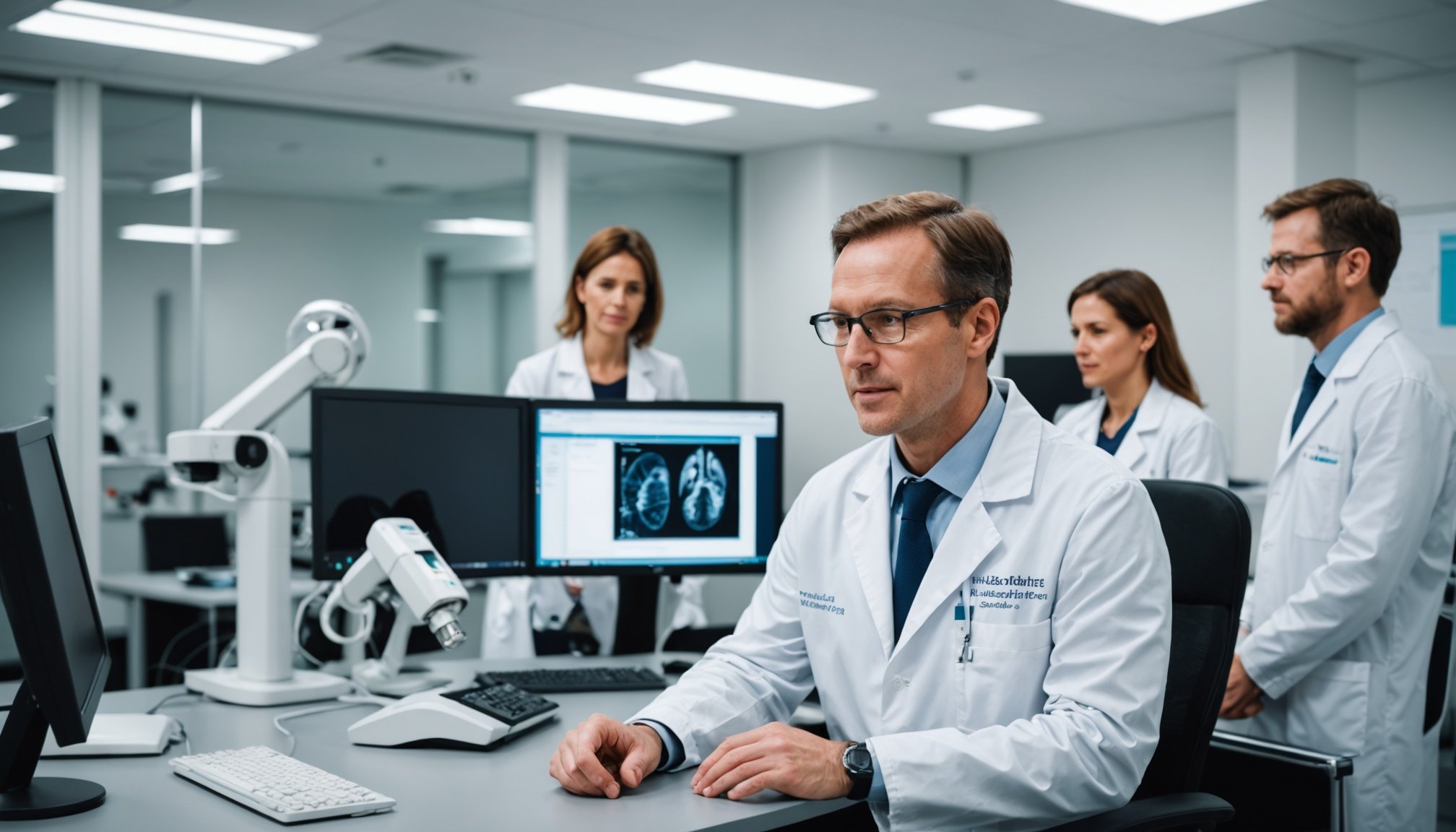Overview of AI in Diagnostic Healthcare
In recent years, AI in healthcare has emerged as a revolutionary force, transforming diagnostic innovations across the globe. The scope of AI within healthcare diagnostics is vast, encompassing various technologies designed to enhance healthcare technology. At its core, AI leverages algorithms and machine learning to analyse complex medical data, enabling precise and timely diagnostics.
Historically, the evolution of AI applications in medicine dates back to early computer-aided systems, which provided basic analytical support to healthcare professionals. Over time, advancements have accelerated, leading to the integration of highly sophisticated AI systems capable of autonomous decision-making in diagnostic procedures.
This might interest you : Transforming UK Finance: The Game-Changing Impact of AI Innovations on Future Financial Services
Currently, the UK healthcare system stands at the forefront, integrating AI into routine clinical practices. Hospitals and clinics utilise AI to streamline patient assessments and enhance diagnostic accuracy. The adoption of AI-driven tools is continually expanding, driven by investments in research and development aimed at innovating diagnostic innovations. Moreover, the UK is focusing on developing infrastructure to support the implementation of emerging healthcare technology. This proactive approach is paving the way for a future where AI plays a pivotal role in improving diagnostic outcomes and overall patient care.
Key AI Technologies Transforming Diagnostics
AI technologies are propelling significant advances in the field of diagnostics, particularly with the deployment of machine learning and deep learning. These technologies are instrumental in deciphering complex medical data, enhancing diagnostic precision.
In the same genre : Driving product development: harnessing big data innovation in uk tech companies
Machine learning algorithms excel in identifying patterns within enormous datasets, enabling precise disease detection and prognosis. For instance, in cancer diagnostics, machine learning can recognize abnormal cell formations more reliably than traditional methods. On the other hand, deep learning, a subset of machine learning, employs neural networks to simulate human decision-making, enhancing diagnostic capabilities further. This has been particularly transformative in fields like ophthalmology, where it assists in early detection of diseases like diabetic retinopathy.
Additionally, natural language processing (NLP) plays a crucial role in interpreting unstructured medical data. By analyzing clinical notes and electronic health records, NLP allows for the extraction of meaningful information, assisting clinicians in diagnostic decision-making.
Integrating AI with imaging technologies has vastly improved diagnostic accuracy. AI enhances images from X-rays, CT scans, and MRIs, providing detailed visuals that aid in precise diagnosis. This amalgamation not only augments efficiency but also reduces the margin for human error, making diagnostics more reliable than ever before.
Case Studies of AI Innovations in UK Healthcare
AI innovations in UK healthcare are making significant waves, showcasing remarkable diagnostic success stories. These AI case studies demonstrate the transformative potential of technology in enhancing patient care and outcomes.
Case Study 1: Early Detection of Diseases
One noteworthy example is an AI system used for early disease detection, focusing on breast cancer. This system has been developed in collaboration with leading technology firms and healthcare providers. It has achieved outstanding accuracy, performing on par with human radiologists in identifying early signs of the disease. Such advances have improved patient care by enabling earlier interventions, thus significantly increasing survival rates.
Case Study 2: AI in Radiology
The use of AI in radiological diagnostics has revolutionised interpretation speed and accuracy. AI-driven platforms allow for faster analysis of imaging results, reducing the waiting period for patients. However, the implementation faces challenges, such as requiring comprehensive training datasets and overcoming initial resistance from medical professionals.
Case Study 3: AI for Personalized Medicine
AI applications in developing personalised treatment plans harness decision support systems to tailor therapies to individual genetic makeup. Patients have reported positive experiences, noting the personalised insights enhance trust and engagement in their healthcare journey. These innovations are reshaping how healthcare is delivered in the UK.
Benefits of AI in Diagnostic Healthcare
AI benefits in diagnostic healthcare are transforming the landscape by significantly enhancing diagnostic accuracy. One of the primary advantages is the remarkable improvement in accuracy and speed, allowing for timely interventions. For instance, AI systems can analyse vast datasets rapidly, identifying subtle patterns that may be overlooked by human specialists. This leads to early intervention, crucial in conditions like cancer where early detection can substantially increase survival rates.
Moreover, AI can lead to a reduction in healthcare costs. By optimizing diagnostic processes and minimizing errors, AI reduces the need for repeat tests and associated expenses. This efficiency can alleviate the financial burdens on patients and healthcare systems alike.
AI also enhances patient engagement. With the ability to provide personalised insights and recommendations, AI empowers patients to participate actively in their healthcare journey. For example, AI-driven predictive analytics can guide patients in understanding their health risks and managing their conditions proactively.
By delivering tailored information, AI fosters stronger patient-clinician partnerships, ultimately improving overall patient outcomes. These advances underscore the transformative potential of AI in reshaping diagnostic healthcare for better, more efficient patient care.
Challenges and Limitations of AI in Diagnostics
Integrating AI technologies in healthcare brings significant potential, yet it is not without challenges. Data privacy is a pressing concern; safeguarding patient information requires robust security measures. As AI in healthcare expands, ensuring the confidential handling of sensitive medical data becomes crucial. Patients and healthcare providers alike must trust that digital protocols are solidly in place.
Another hurdle is the ethical considerations surrounding AI decision-making. Questions arise about the transparency of AI algorithms and their alignment with human values. For healthcare providers, ethical dilemmas often revolve around ensuring AI decisions are as just and equitable as possible, minimizing any inherent algorithmic bias.
Additionally, overcoming resistance from healthcare professionals and institutions is essential. Adoption of AI-driven diagnostic innovations may face skepticism due to perceived threats to professional autonomy or job security. Promoting understanding and demonstrating AI’s complementary role to human expertise could alleviate these concerns.
AI challenges highlight the necessity for comprehensive education and training, ensuring medical professionals are equipped to harness AI’s potential while respecting its boundaries. Addressing these limitations is key to progressing beyond these technological barriers into a future enriched by AI’s capabilities.
Future of AI in Diagnostic Healthcare in the UK
As the landscape of healthcare technology continues to evolve, the future of AI in healthcare diagnostics promises transformative advancements. In the coming years, the integration of AI advancements is expected to redefine diagnostic processes within the UK healthcare system dramatically.
Predictions and Potential Solutions
AI in healthcare is set to enhance diagnostic precision and accessibility. Predictions suggest that AI will increasingly address healthcare inequalities, ensuring all patient demographics gain from enhanced diagnostic innovations. AI’s role in equalizing access to healthcare services cannot be overstated, as it holds the potential to bring advanced diagnostic capabilities to underserved populations.
Necessary Research and Investments
To realize this potential, ongoing research and investment in AI technologies are vital. Fostering innovation in this field will support the development of AI solutions capable of addressing complex health issues efficiently. Continued funding and study into AI’s role in healthcare technology can bridge current gaps, advancing the future of health diagnostics in the UK.
The forward-thinking approach in UK healthcare trends emphasizes a commitment to harnessing AI advancements, promising to transform healthcare delivery and outcomes.










